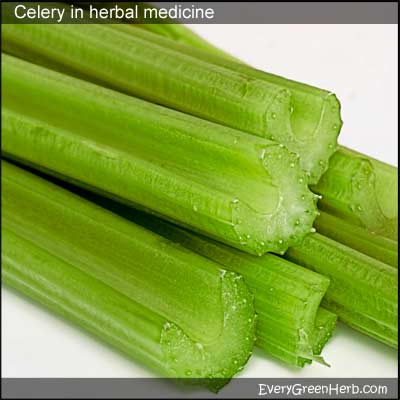Celery in herbal medicine
Celery (Apium graveolens L) is a stimulating, nourishing, and restorative herb. Celery has properties that help remove toxins from the body and is an effective urinary tonic.

Celery reduces the severity of gout by increasing uric acid excretion. This vegetable also lowers blood pressure, stimulates milk flow, and relieves arthritis pain.
Celery is useful in the kitchen and in herbal medicine.
It has a delicious crunch, relieves joint pain, and helps rid the body of toxins via the urinary tract. Celery is one of the best natural remedies for urinary health.
Celery seeds are useful, too.
Celery seeds contain many of the same properties as the plant. Celery seeds are cleansing, relaxing, diuretic, and also a remedy for bladder infections.
Eating celery seeds can help reduce the degeneration of joints that occurs as the body ages. Everyone that has arthritis should add celery and celery seeds to their diets. Find more natural remedies for arthritis.
It is easy to get celery and celery seeds into the diet – add them to coleslaw, salads, pickles, marinades, stews, and soups.

Celery essential oil
Celery essential oil, found in many health food stores, is good for treating gout pain, fungal infections, arthritis, and cellulite. Use 10 drops in a pan of water for soaking or 2 drops in an ounce of oil for massage.
Celery essential oil is a valuable tool in aromatherapy where it benefits nervous conditions, relieves water retention, and purifies the kidneys.
Celery essential oil is also used in the treatment of tumors.
Scientific studies on celery
Studies show that celery is full of antioxidants that fight harmful free radicals in the body. Celery is one of the most important sources of phytochemicals that decrease oxidative damage in cells.
The plant also contains carbohydrates, flavonoids, alkaloids, steroids, vitamins, and minerals.
Celery is used in many cultures to treat heart disease, liver disease, the urinary tract, gout, and rheumatic disorders.
Research shows the plant is also effective in helping to increase fertility.
Celery reduces glucose, blood lipids, and blood pressure. It has anti-fungal and anti-inflammatory properties.
Celery seeds are shown to help treat bronchitis, asthma, skin disorders, vomiting, and fever.
The root is useful for treating edema and the colic.
Buy organic celery when available.
Whenever possible grow your own celery or buy organic celery at the store.
According to the Environmental Working Group's report, celery is among the top 3 foods on which pesticide residues have been most frequently found.
If using commercially grown celery, scrub the stalks under running water with a vegetable brush. Discard the base of the plant which collects more toxins than the stalks.
Growing celery
The slender celery plant grows to three feet tall. As a vegetable, celery is cultivated for the green and blanched leaf stalks.
Celery seeds come from a plant that is related, but not identical to the celery stalks grown as vegetables.
Both are related to parsley and grow under the same conditions.
Getting the tiny celery seeds to sprout is tricky. Store in freezer until ready to start indoors then pour hot water over them and soak overnight. Mix seeds with fine sand and scatter on top of soil. If kept warm and moist, they should sprout in three weeks.
Celery plants like rich, moist soil and cannot tolerate frost.
Plant seedlings in the garden about one foot apart. Add compost mulch as plants grow and water regularly when needed.
Blanching should be done 4 weeks before harvesting. Tie stalks together with strips of cloth, and then earth them up gradually until only the leaves poke out above the dirt. You want to keep your growing celery stalks out of the sun.
*Always consult with a healthcare professional before using any herbal remedy especially if pregnant, nursing, or taking other medications.
Sources:
https://www.ncbi.nlm.nih.gov/pmc/articles/PMC5871295/
https://pubmed.ncbi.nlm.nih.gov/31464016/
Blessings to you and yours!
Thanks so much for reading my blog. Jan.

*Note - the information on this website has not been evaluated by the Food and Drug Administration.
© 2005-2024 website design and content by Janice Boling